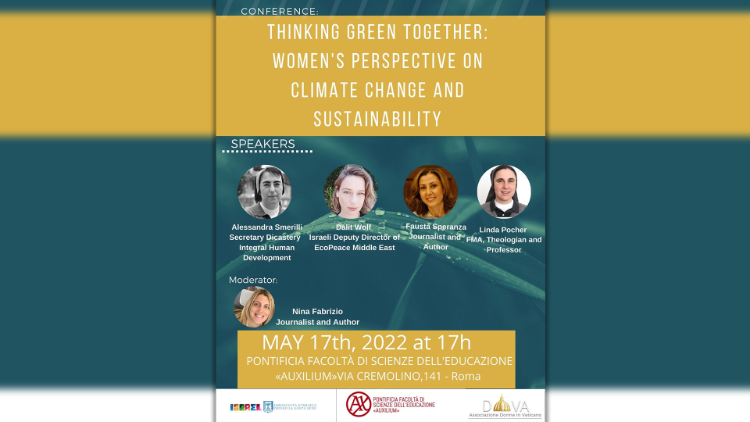Turn self-interests into mutual gain to overcome climate change
By Devin Watkins
“As Pope Francis said in the days leading up to COP26, only if we all stop hiding behind our borders and work together can we create climate resilience and create solutions.”
Dalit Wolf Golan offered that perspective to Vatican News ahead of an event in Rome about climate change and women’s role in finding solutions.
“Thinking Green Together: A Feminine Perspective on Climate Change and Sustainability” is the title of the conference hosted on Tuesday at the Pontifical Faculty of Educational Sciences Auxilium, which was organized by the Embassy of Israel to the Holy See and the Association of Women in the Vatican (DIVA).
Long-running problem
Ms. Wolf Golan, the Deputy Director of EcoPeace Middle East, works to turn a common problem in the Holy Land—the lack of potable water—into an issue on which to build consensus.
Some households in the Middle East, she said, live with an intermittent water supply, with access to water only once a week, once every 2-3 weeks, or even once every 3 months in the summer.
“Now, imagine running a household like that,” she said. “You have a tank on your roof that stores water. But how can you bridge that gap when it becomes two weeks, three weeks, three months?”
This daily hardship can greatly affect the quality of life of women in her region.
Women and water
Though the burden of water shortage falls heavily on women, noted Ms. Wolf Golan, most political leaders are men, who potentially have the tools to effect change but at the same time often lack the interest to make the issue a priority.
So, EcoPeace Middle East seeks to educate residents of Israel, Jordan, and Palestine about the realities of water in their region and about how climate change will aggravate the situation.
Palestine and Israel, for example, have a water arrangement that dates back to the 1995 Oslo Accords and which allocates 75% of water to Israel and 25% to Palestine, according to Ms. Wolf Golan. The arrangement remains unchanged because water is among the 5 “permanent status issues” that must be hashed out between Palestine and Israel.
Political will for change
Ms. Wolf Golan pointed out that the situation has changed greatly since 1995 regarding water. Israel, she said, has more than enough water due to increases in desalination capacity and ability to reuse wastewater.
She added that this new reality offers the “technical and real possibility for these allocations to be discussed, if there is the political will to do so.”
Turning self-interest into mutual gain
Though borders between Jordan, Israel, and Palestine are more or less open, Ms. Wolf Golan pointed out that very little political or common contact occurs between the three and that “there is a lot of mistrust.”
She highlighted her NGO’s work to break down the misconceptions through education and focusing attention on shared challenges.
Faith-based reasons to work together
Religion in the Holy Land—rather than being a barrier—can help galvanize people into overcoming their differences to work toward a common goal.
Ms. Wolf Golan noted that the Jordan River is holy to Christianity, Islam, and Judaism but that it currently runs at 5% of its ancient flowrate.
“It's also a symbol of a problem that cannot be solved unless we work together,” she said. “It's a border. It doesn't matter if one side cleans up the river, if the other side doesn't.”
Yet, as a religious symbol, leaders from various faiths can engage each other in working to seek out a solution on the political level.
The example shows how the environment can help different nationalities “come together to work on a common problem,” said Ms. Wolf Golan.
Thank you for reading our article. You can keep up-to-date by subscribing to our daily newsletter. Just click here









